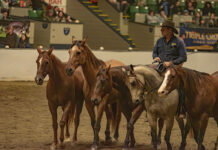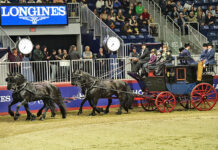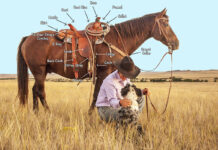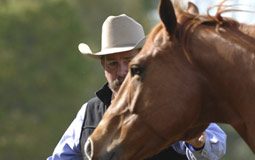“Loose horse!”
As hard as we try, we can’t always control what happens. Watching your horse trot away from you and then break into a run is an inevitable eventuality. In addition to the inconvenience of having to catch your wayward beast, there is the potential for injury to himself or others during his jaunt. Additionally, horses are herd animals, so there can be an unintentional domino effect – a previously calm horse sees or hears a buddy tearing around and starts to act as though he’s in danger too.
While it’s best to get a horse-on-the-loose under control as quickly as possible, doing so in haste can cause more harm than good. If your horse thinks you’re chasing him, it could fuel his fire and make him run harder. If you’re feeling frustrated or angry because he escaped, dang it! (hey, we have all been there), don’t let those feelings influence your behavior. Your horse will pick up on them and feel reluctant about letting you to approach. The best case scenario is that your horse gets away and serenely wanders to a nearby patch of grass, allowing you to simply clip on the leadrope as he grazes.

Unfortunately, it doesn’t always work out that way. If your horse high-tails it vigorously, follow these 10 dos and don’ts for wrangling a runaway:
- Don’t panic. Keeping your cool is the best thing you can do for your horse.
- Do give the “loose horse!” shout if there are other people in the area.
- Do grab a halter and lead if your horse isn’t already wearing them.
- Do close perimeter fences (or barn doors if your horse is in the barn).
- Don’t try to catch or jump in front of your horse while he’s running.
- Do be extra cautious. An agitated horse is often unpredictable.
- Do enlist the help of a friend to help block escape routes.
- Do approach your horse calmly once he’s settled down.
- Don’t punish your horse once you’ve caught him.
- Do check your horse thoroughly for injuries.
Once caught, it will take a few minutes for the adrenaline to clear out of your horse’s bloodstream and for his mind to realize that the excitement is over. Continue to be extra careful during this time because your horse may still nervous and jumpy. Taking him for a quiet walk will help him regain his composure and return to the subdued steed he was before his great escape.
Liked this article? Here are others you’ll enjoy:
Video: What to Do When Your Horse Starts Bucking
Video: What to Do If Your Horse Bolts
Dale Rudin is a CHA-certified riding instructor and clinician with a mindful and balanced approach to horsemanship and riding.
www.un-naturalhorsemanship.com






I live in the country, and my horses get let out of the pastures, to eat on the lawn, nearly daily. So if they ever get out, that is where they go to eat.
good advice mine occasionally like to venture around the property scary when decide want to go on the road
my horses are half pigs….. i take half full feed bucket with me, it works everytime!
My horse is often loose. Not really a problem out here in the boondocks.
The one mistake most people do make though with any loose animal is to chase it! If I had a yelling human chasing me I’d run like the wind too!